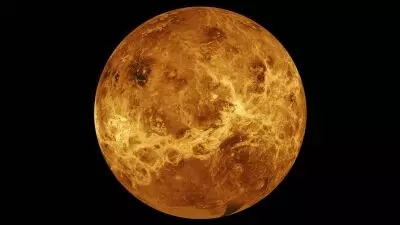
Planet venus could never support life, shows new study
text_fieldsA new study by a team of astrophysicists led by the University of Geneva (UNIGE) and the National Centre of Competence in Research (NCCR) PlanetS, Switzerland, suggest that life did not exist on planet Venus. Earlier studies had suggested that Venus may have had its own liquid water oceans and hence supported life. The new study is published in the journal Nature.
The team studied how the atmospheres of Earth and Venus would evolve over time and if oceans could be formed in the process. They used sophisticated three-dimensional models of the atmosphere similar to those used by scientists to simulate Earth's current climate and future evolution.
"Thanks to our simulations, we were able to show that the climatic conditions did not allow water vapour to condense in the atmosphere of Venus," said Martin Turbet, astrophysicists and researcher at the Department of Astronomy of the Faculty of Science at UNIGE. The finding implies that temperature on the Venus never fell low enough to allow the formation of raindrops. Instead, it remained as gas in the atmosphere and oceans were never formed.
"One of the main reasons for this is the clouds that form preferentially on the night side of the planet. These clouds cause a very powerful greenhouse effect that prevented Venus from cooling as quickly as previously thought," Turbet said. Earth too could have suffered the same fate as Venus had the Earth been a little closer to the Sun or the Sun shone as brightly then as it does now, the scientists revealed. The relatively weak radiation of the Sun then allowed Earth to cool down enough to allow for condensation of water and the formation of oceans. It had always been considered that if the Sun's radiation were much weaker than today, it would have turned Earth into a ball of ice unfit for life.
"But it turns out that for the young, very hot Earth, this weak Sun may have in fact been an unhoped-for opportunity," the researchers said.






















